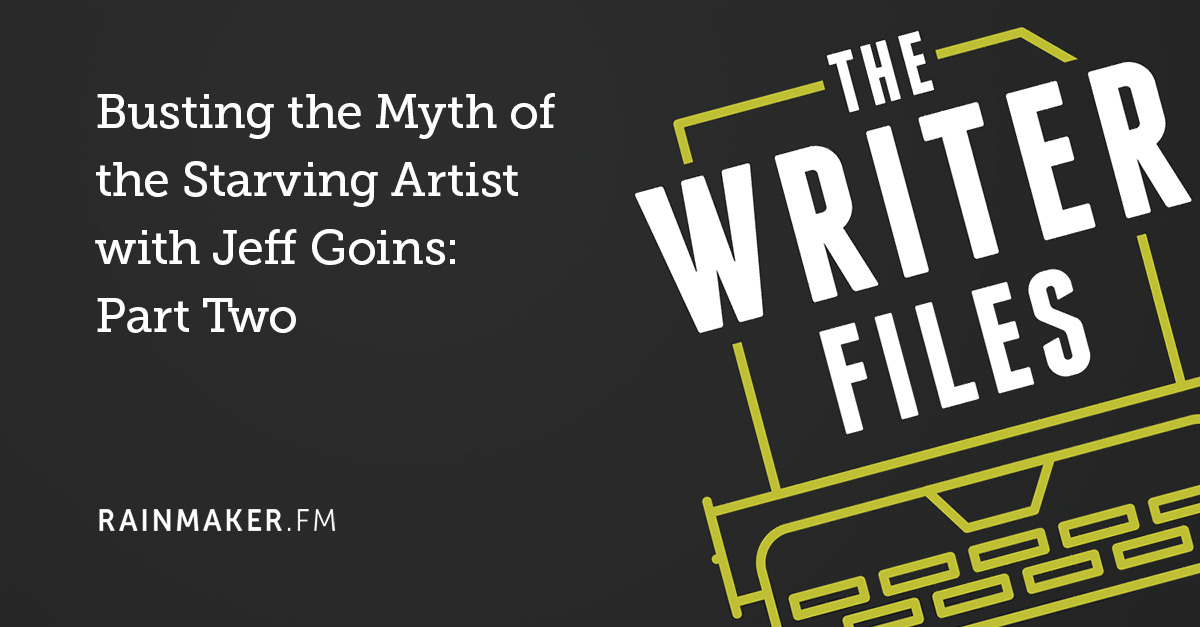If you’re a writer, you might have heard this most of your life:
People don’t make a living writing. You should find something practical to do with your life.
Smart, capable writers grimly pass around war stories on Facebook. Penny-a-word assignments, clients who don’t pay, disdain for our craft, and disrespect for our profession.
And yet, look around at this digital world so many of us spend our lives in — it’s made of words. The technology to produce digital content exists because we create words worth sharing.
Text, video, audio — it all needs great writing if it’s going to be worth spending our time on.
If writing is your profession and your passion, you can accept crap assignments for crap money and crap treatment.
Or, you can choose something better. Because there is something better.
In the time I’ve been writing professionally, I’ve noticed some necessary traits, abilities, and strengths that make the difference between life as a well-paid writer and life as someone who likes to write but can’t seem to get paid for it.
Here are seven of the most important.
#1: Love
This might seem squishy, but if you’re meant to be a writer, you know what I mean.
There is no substitute for the love of writing. For the passion of getting the words right: the head-scratching and the pacing around the house and the endless drafts that aren’t quite right yet.
If you don’t love language and your topic and the act of putting words together, none of the rest of this really means anything.
I could have just as easily used Compulsion, Obsession, or Bullheadedness for this section. Whichever word you choose, it’s about refusing to settle for weak writing, because the words matter.
#2: An attitude of service
Writing for self-expression can be high art, pursued for the sake of your own experience of truth and beauty.
As soon as money changes hands, though, the audience — the reader, listener, or viewer — becomes the focus.
Professional writers work from an attitude of serving their audiences. Serving them with truthful, beautiful words, yes. But also with language that meets their needs, language that clarifies rather than prettifies.
Novelists, copywriters, and content marketers all live in service to our audiences. No matter how clever or perfectly poetic we may find a phrase, if it doesn’t serve the audience, it goes.
#3: Confidence
It’s always struck me as odd that many of the most capable writers are also some of the most insecure.
But it doesn’t need to be that way. Confidence comes from putting the work in to become a genuinely authoritative expert. It comes from research, craftsmanship, and seeing the difference you make to your audience.
Serious craftspeople are humble and proud at the same time.
The pride and confidence come from hours of deliberate practice — the kind of work that expands your abilities and challenges you to grow. The humility comes from the knowledge that a true pro is always improving, expanding, and refining.
#4: Training
Many writers imagine that if you have a good writing voice and a strong opinion about the serial comma, you’re qualified to work as a professional copywriter.
Not so fast.
Great copywriters and content marketers are fine wordsmiths, but they’re also strategists. They understand what types of content work to attract attention, to stand out amid the sea of content clutter, to motivate buying behavior, and to help the audience make the journey from interested bystander to loyal customer.
Solid content and copywriting strategy come from training (and practice). You can get a lot of that training right here at Copyblogger, of course.
And for writers who are serious about professionalism, we have a course designed to train you about the craft of professional content creation. (The “art” is up to your talent and abilities.)
#5: Discipline
You may be a brilliant wordsmith and master strategist, but if you don’t devote yourself to the butt-in-chair time needed to produce a significant quantity of work, you won’t get where you want to go.
To a great degree, discipline is a set of habits that can be cultivated. As a writer, you can string together rituals, create the right work environment, and adopt the behaviors of productive writers.
As a working writer, you also need to throw in a set of habits that will ensure that you meet your deadlines, keep clients updated, and invoice your clients promptly.
If you care enough, you’ll do it. The habits can be difficult to put into place, but fortunately, once they’re in place, they tend to keep you on the right track. (That’s the difference between habits and will power.)
#6: The willingness to become a marketer
There is some money in writing fiction. (For the lucky few, there’s a great deal of money. Emphasis on few.)
There’s also still a little bit of money in journalism and feature writing, especially if you have excellent contacts.
But for the most part, if you want to make a living as a writer, the fastest, most enjoyable way to do that is to write content for businesses that want to find more customers.
It’s interesting, lucrative, very much in demand, and it will get you researching and investigating as many different topics as you like.
You might think that this kind of writing is boring to do. Far from it. Creating really good content (as opposed to the mass of junk that makes up 95 percent of web copy) will call on your skills as a storyteller, investigator, wordsmith, and historian.
A well-qualified content marketer needs all the skills of a great feature or fiction writer — combined with solid marketing strategy.
You also, of course, need to get comfortable marketing yourself. This can be surprisingly tough even for writers who create superb marketing for their clients.
“Create a bunch of content and hope someone wants to do business with you” won’t work for your writing business any more than it will for your clients’. You need to apply the same strategies and frameworks to your own business that you do to theirs.
If this doesn’t come naturally to you, don’t let that worry you. It doesn’t come naturally to a lot of good writers. But it’s something that’s well within your ability to learn. And we have some resources that can help.
#7: Support
One of the tough things about living as a professional writer is that the path you walk is one you make yourself.
There’s no one to tell you which direction to go, no one to give you sign posts along the way, and no one to outline your day for you and tell you where you need to be and when.
That’s also one of the fantastic things about living as a professional writer. But sometimes Fantastic is also Difficult.
Writing is a lonely business. And it can be just a little lonelier when you don’t have colleagues to bounce questions off of or share your gripes and triumphs with.
When you do find a community of writers, though, it’s a lovely thing. They’re some of the most funny, smart, and quirky people you’ll ever meet. And it just feels good to hang out with people who get you.
(Because your friends and family actually do think you’re sort of a weirdo.)
Where to find professional writers and content marketers
If you need a talented, passionate, skilled writer with terrific knowledge of marketing strategy, our Copyblogger Certified Content Marketers are ready to help with your projects.
You can find a complete list of them here: Certified Content Marketers.
Or, are you a writer who wants to become a professional content marketer?
For you, we’d recommend participating in our Certified Content Marketer training program. It’s usually closed, but we’ll reopen it soon for a short time to invite a new group of students inside.
We’d love to see you there. Add your email below and we’ll let you know when we’re enrolling a new group of writers.
Editor’s note: The original version of this post was published on August 30, 2014.



![[08] 10 Goals that Make Content Marketing Meaningful](../../rainmaker.fm/wp-content/uploads/2017/07/sites-008.jpg)


I wonder how long I’d been writing before I learned these. I’m going to give my “amen corner” shout to discipline, because that’s the case in any venture where you are your own boss. Writing is only one example. But yep, gotta have it. It’s vital to think of yourself as a writer and read about writing and have writerly ideas and interact with other writers, but the oft-repeated “put your butt in the chair” advice is oft repeated for a reason.
Thanks, Michael.
Butt-in-chair time has magic powers …
You start with love and then add the traits one by one till you become the top notch writer.
Sonia, it is beautiful how you presented it. It paved the way for many writers. Some of us are guilty of doing mediocre work, others take charge and level up.
Beautiful insight, stay Awesome.
Thanks Rohan.
This is so true! All of these things are essential for becoming a great copywriter/freelancer/blogger.
You find you’ll have a lot/all of these traits (e.g love for writing) if you are already a writer. We must do what we love, and do it well.
Benjamin
Probably safe to say that #1 can help you make a living at just about anything Great article Sonia!
Great article Sonia!
Gotta have the love so you have the energy to run the whole race … but strategy helps a lot, too.
“People don’t make a living writing. You should find something practical to do with your life.” I have heard this in more than just writing! I follow my passions regardless of what others think and it has done me well Thanks for sharing Sonia!
Thanks for sharing Sonia!
Me too! It’s great fun to prove them wrong. 😉
#2 has really changed my perspective on writing. I used to write for my own personal wants and desires. Now I really focus on what I can give the reader and if I can add good value for them. The responses are much better in doing so.
I’d have to agree 100% with this as it is my experience as well.
It’s that balance. You have to be happy with your own work — but when you’re asking other people to give you their time and attention, then you owe them some degree of quality and usefulness.
Content Writing has evolve as one of the best way to generate income. As a writer one have to increase quality and many other skills to stay in the premium group of writer to get high pay. Thanks for sharing these useful tips to become a good writer.
I wish I can absorb all the 7 things you’ve mention.
And I will be a great writer like you.
Thanks for this great post.
Great points, Sonia. Just having the courage to do it is 80 percent of the battle, I think.
A good article Sonia. I agree that confidence is a key trait of successful writers. I believe this is the same type of confidence that subject matter experts sometimes lack when presenting at conferences and the delivery then devalues the presentation.
I also think creative thinking is import as it becomes far too easy to regurgitate the same topics and outcomes as everyone else and morph into ‘Mr/Mrs Predictable’. The confidence to present your own opinion and ideas without having to follow the crowd is a trait that all of these well-paid writers will have in abundance.